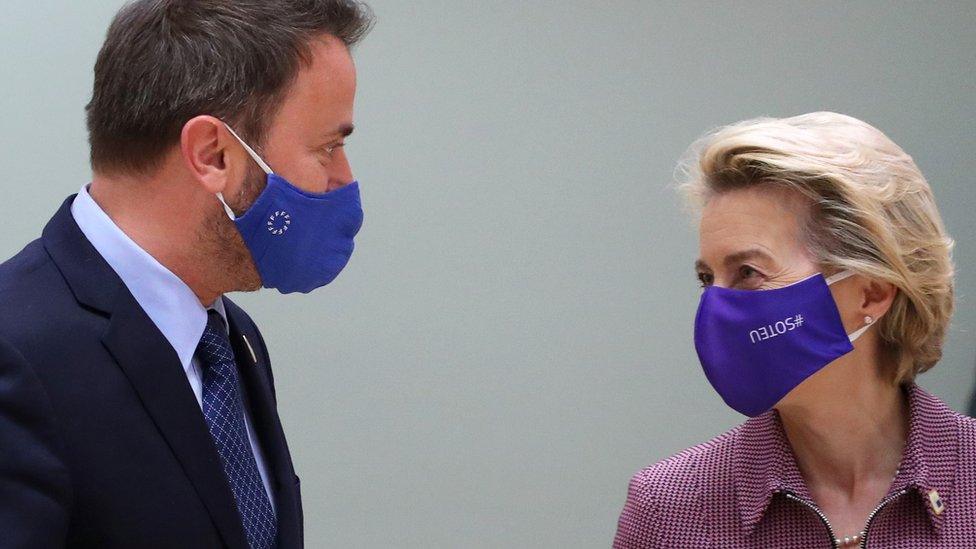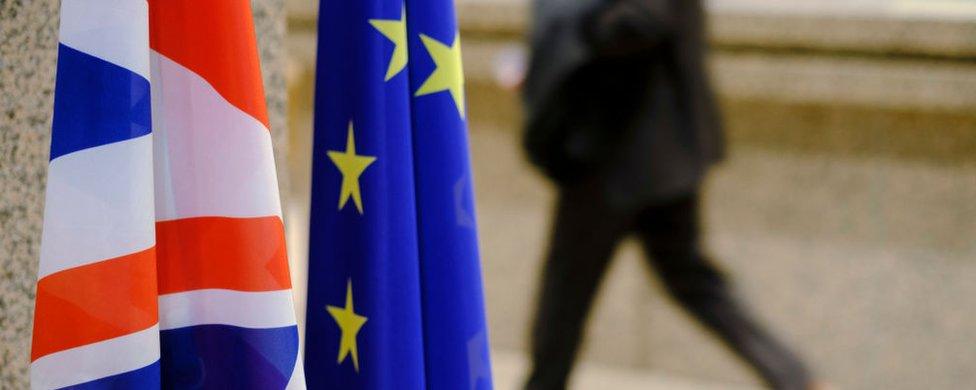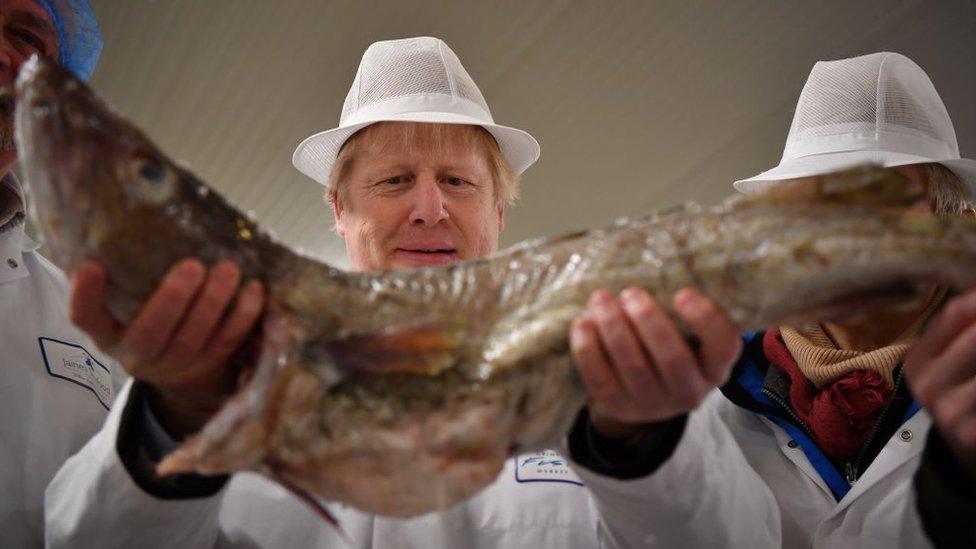Brexit: EU leaders call for UK trade talks to continue
- Published
- comments
"A few words on Brexit" – EU leaders' views from the summit
EU leaders have called for post-Brexit trade talks to continue beyond the end of the week - the deadline suggested by UK Prime Minister Boris Johnson.
At a two-day summit in Brussels beginning on Thursday, they called on the UK to "make the necessary moves" towards a deal.
EU chief negotiator Michel Barnier said fresh "intensive" talks should aim to reach a deal around the end of October.
But his UK counterpart said he was "disappointed" by the EU's approach.
Lord David Frost tweeted the EU was expecting "all future moves" for a deal to come from the UK, which he called an "unusual approach to conducting a negotiation".
He added the prime minister would react to the EU's position as the summit wraps up on Friday.
Both sides are calling on each other to compromise on key issues, including fishing and limits on government subsidies to businesses.
They are seeking an agreement to govern their trading relationship once the UK's post-Brexit transition period ends in December.
Following the talks on Thursday, German Chancellor Angela Merkel said "in some places there was movement, in other places there is still a lot of work to do."
"We have asked Great Britain to continue to be willing to compromise towards an agreement. Of course, this also means that we have to make compromises," she told reporters.
European Council President Charles Michel said the EU would decide whether talks should continue in the coming days, based on the UK's next move.
Mr Barnier said negotiations were "not finished", and the EU was ready to accelerate talks from Monday for the "two or three weeks that remain before us".
Earlier, in a conclusions document, external issued during the summit, the EU said progress in key areas was currently "not sufficient" to reach a deal.
It asked Mr Barnier to "continue negotiations in the coming weeks".

Confused war of words

The formal written conclusions of EU leaders' Brexit meeting seemed harsher than expected.
They insisted it was up to the UK to make "the necessary moves" for a deal to be reached.
No hint that the EU too was preparing to compromise - and words matter in these highly sensitive negotiations.
The UK's chief negotiator immediately took to Twitter to object.
He also noted that, while EU leaders had called for negotiations to continue, their document didn't describe them as "intensive" talks.
Minutes after, the European Commission tweeted that its chief negotiator Michel Barnier had called for two weeks of intensive talk to start as of Monday.
So what do we learn from this confused war of words?
Negotiations are drawing to a close, difficult political compromises loom for both sides, tempers are frayed, and time is tight.
All eyes are on Boris Johnson on Friday, when he has promised to announce the UK's next move.

As the summit got under way, EU Commission President Ursula von der Leyen said she would be self-isolating for the second time in a month after a member of her staff tested positive for Covid-19.
In a tweet, she added she had tested negative herself but would be leaving the summit "as a precaution".
Arriving at the summit, French President Emmanuel Macron said his country's fishermen would not "in any situation" be "sacrificed to Brexit".
"We didn't choose Brexit. Preserving access for our fishermen to British waters is an important point for us," he told reporters.

Mrs von der Leyen (R) left the summit early after exchanging views with EU leaders.
The Taoiseach (Irish prime minister) Micheál Martin said a deal was still possible "within the timeframe available to us".
He told the BBC a no-deal outcome would represent a "significant additional shock to our societies" on top of the Covid-19 pandemic.
"That is a motivating factor in seeking to arrive at a comprehensive deal," he added.
Dutch Prime Minister Mark Rutte said: ""It would be crazy for the outside world if the UK and the EU will not be able to come to an agreement".
Why does 15 October matter?

Over the summer, both the UK and EU seemed to agree the end of October was the final date to get a deal done - allowing enough time for it to be ratified before 31 December.
But come 7 September, Boris Johnson decided to shorten the deadline.
He said, external if a deal wasn't reached by 15 October, "then I do not see that there will be a free trade agreement between us, and we should both accept that and move on".
Thursday was that day - but Downing Street appears to have moved back from it as a hard deadline.
Formal negotiations ended at the start of October, but Mr Johnson and Mrs von der Leyen pledged to "intensify talks" over the coming weeks.
Pressed on whether the UK would walk away on 15 October, the government's chief negotiator Lord Frost said it was his job to "advise the prime minister" on whether a deal was on the cards by then.

By remaining in the bloc's single market and customs union, the UK has continued to follow EU trading rules during its post-Brexit transition period.
This 11-month period is due to end in December, and the UK has ruled out seeking an extension.
Formal talks began in March and continued throughout the pandemic, initially via video link before in-person discussions resumed over the summer.
If a deal is not done, the UK will trade with the EU according to the default rules set by the World Trade Organization.

YOU, ME AND THE BIG C: About Cancer Treatment and Covid-19
LONG COVID: What's the science behind the long term symptoms?

- Published18 December 2020
